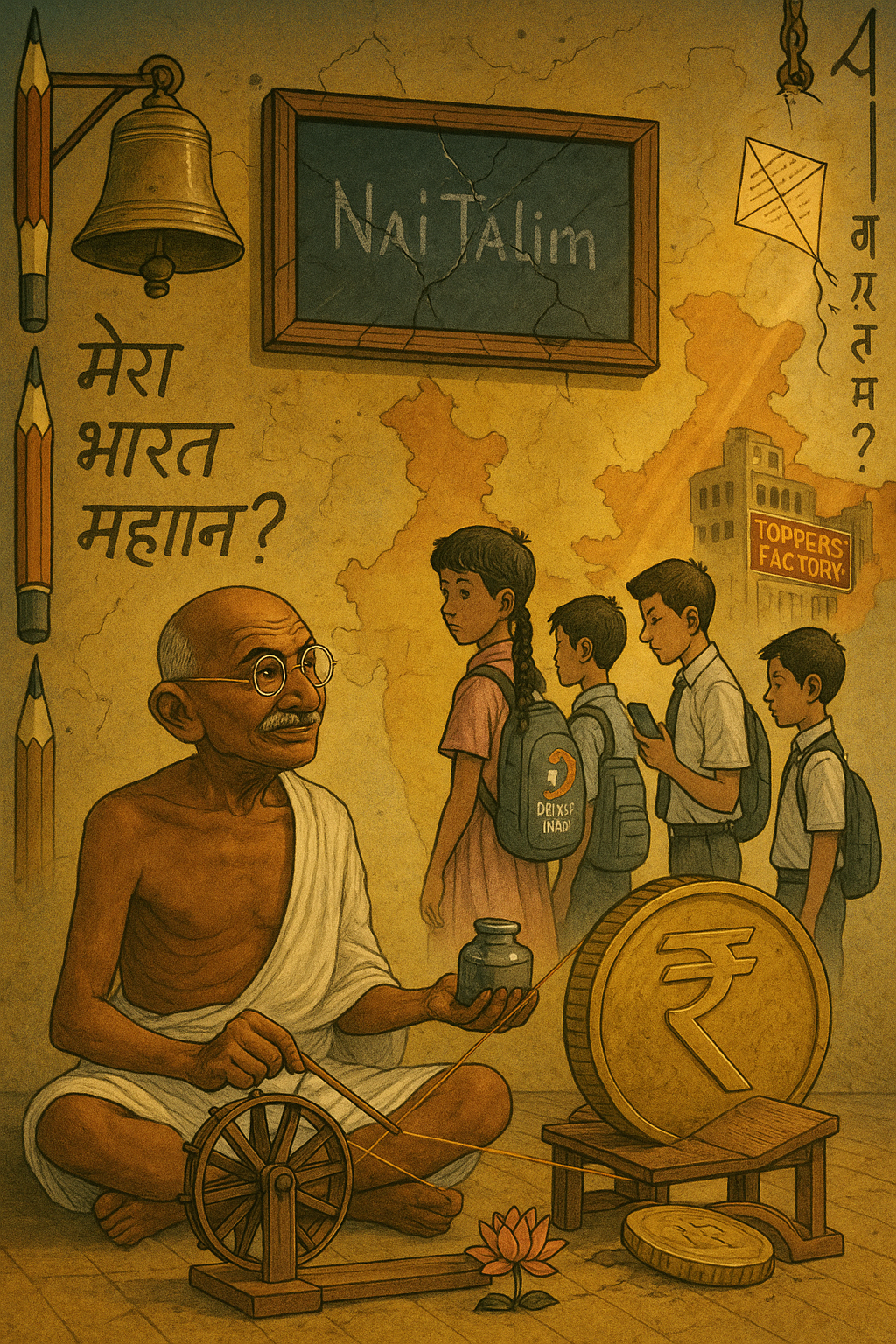In a world where data is currency and digital tools are the new chalk, this is a crisis, not a statistic.
Literacy ≠ Education: Time to Burn the Old Playbook
🎓 What is the soul of education?
Is it just about literacy rates, skilling youth for jobs, or reducing unemployment? Or does it go deeper—into shaping minds that can think freely, question boldly, and respond wisely to a rapidly evolving world?
Mahatma Gandhi once said,
“Literacy in itself is no education… Education means the all-round drawing out of the best in child and man—body, mind, and spirit.”
In a world shaken by war, artificial intelligence, climate breakdown, and social fragmentation, that Gandhian vision rings louder than ever. India stands at a historic threshold—not just to improve education statistics, but to redefine what education must mean for the 21st century.
🌍 Adapatability – The New Survival Skill
We live in a time when tomorrow feels like uncharted territory. Pandemics, polarised politics, job market disruptions, and algorithmic dominance have made adaptability—not academic degrees—the new survival skill.
In such a world, rote learning of textbooks has little value. The real test is whether learners can:
- Solve real problems
- Think creatively across disciplines
- Collaborate across cultures
- Learn, unlearn, and relearn constantly
The dual responsibilities of modern education are clear:
- Prepare every learner for life—not just exams
- Allow each learner to learn at their own pace, in their own way
📉 Where Do We Stand Today?
India’s National Education Policy (NEP) 2020 set the stage for ambitious reform. Its ideas are visionary. But ideas without implementation are just ink on paper.
Let’s examine what the data says:
🔎 Foundational Learning: Still Fragile
- According to the Annual Status of Education Report (ASER), fewer than 45% of students can perform basic math or reading tasks.
- The rise in skills is encouraging—but we started from a disturbingly low baseline.
🖥️ Digital Divide in Classrooms
- Only 54% of schools have access to the internet.
- Only 50% have working computers for students.
In a world where data is currency and digital tools are the new chalk, this is a crisis, not a statistic.
🎓 Higher Education: Wide in Quantity, Wobbly in Quality
India boasts the second-largest higher education system in the world—with 58,000+ institutions. Yet, only 28% of eligible students are enrolled in higher education.
Even where seats exist, quality doesn’t always follow. For instance:
- Almost half the mechanical engineering seats go vacant every year.
- Lack of skilled faculty makes expansion of new colleges a hollow gesture.
In research output, India fares better in numbers than in depth:
- We produce 29,000 PhDs/year, while China produces 56,000, and the US 71,000.
- Many Indian doctoral theses, however, fail to meet global benchmarks in originality and relevance.
💰 Investment: Just Enough to Stay Behind?
India spends around 4% of GDP on education—technically within the global 4–6% benchmark. But here’s the catch:
- The majority of funds go to salaries, not innovation.
- Curriculum upgrades, teacher training, or new assessment techniques often get little attention.
If we truly want to prepare learners for a different future, we must invest differently—in content, creativity, and classrooms that empower.
⚖️ Public vs Private: The Equity Conundrum
Private institutions have mushroomed, offering modern facilities—but not everyone can afford them. This deepens the class divide in education.
What’s the solution?
- Strengthen public institutions
- Offer financial support for deserving students to access private education
- Bridge the opportunity gap, not widen it
🌐 Global Models: What Top-Performing Nations Teach Us
Nations like Finland, Estonia, and South Korea have cracked the education puzzle by focusing on:
- Comprehensive teacher training
- Strong national curricula
- Smart use of assessment
- Societal respect for education
- Equitable access and emotional well-being
India can—and must—adapt these lessons to its own context.
🔄 Deschooling Societies
Back in 1971, Ivan Illich provocatively argued in Deschooling Society:
“We have become unable to think of better education except in terms of more complex schools and teachers trained for ever longer periods.”
He urged us to dismantle the one-size-fits-all funnel, and instead imagine networks of learning opportunities—flexible, diverse, and lifelong.
✅ The Bottom Line: Towards a Learning Republic
The NEP 2020 gives us a scaffold, but the house of Indian education needs more than blueprints:
- It needs willpower
- It needs investment beyond budgets—into ideas
- And above all, it needs a cultural shift: from viewing education as a tool for jobs to a foundation for life itself
Because in a world where the only certainty is uncertainty, the greatest skill we can teach is the ability to keep learning, forever.



